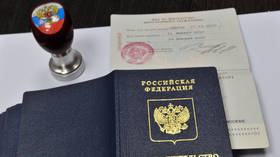
Highly skilled foreign specialists and their families now qualify for a permanent residence permit

FILE PHOTO. © Sputnik / Aleksey Kudenko
A new Russian law has come into effect giving those deemed to be highly skilled foreign workers an opportunity to get a residence permit in the country. Previously, highly skilled specialists could obtain such a permit easier than other foreigners, but only for a limited period of time.
A residence permit can now be granted to highly skilled specialists without any limitations if they have worked legally in Russia for two years. All family members of such foreign workers, including their spouses, children, grandchildren, parents, and grandparents, can also get such a permit if they live in Russia. The legislation also covers adopted children, spouses of the specialist’s children or parents, as well as their adoptive parents.
The amendment was passed by the Russian parliament and signed by President Vladimir Putin between June and July 2023, but came into effect only on Sunday.

Read more
One has to be hired by a legal Russian entity and receive a salary of 167,000 rubles ($1,840) or more, or else work in a national priority field like higher education, healthcare, the high-tech industry or special economic zones, and have a salary between 60,000 and 85,000 rubles ($660 and $935) to be considered a highly skilled foreign specialist under the law.
A foreigner who signs a contract with the Russian military for one year during the conflict with Ukraine will also receive the right to apply for a permanent residence permit in Russia together with their family members. The permit can be revoked, however, if they decide to terminate their contract early.

Read more
Most other categories of foreigners should first get a temporary permit and live in Russia for more than 12 months after it has been granted to them. They also have to pass a Russian language exam – something that the highly skilled specialists are not obliged to do – and collect a number of other documents. The process of getting a residence permit in Russia could sometimes take up to six months in the case of a regular applicant. In the case of a foreign skilled worker, the procedure takes half as much time on average.
Previously, the major drawback for any highly skilled worker in Russia was that their residence permit was strictly tied to their contract and could not be granted for a longer period than three years. After that, it needed to be extended or revoked. The new amendment removes this limitation.
A regular residence permit in Russia used to be valid for up to five years. In 2019, the government introduced an indefinite residence permit for most categories of foreigners applying under the regular procedure, but this did not cover highly skilled specialists at that time.




